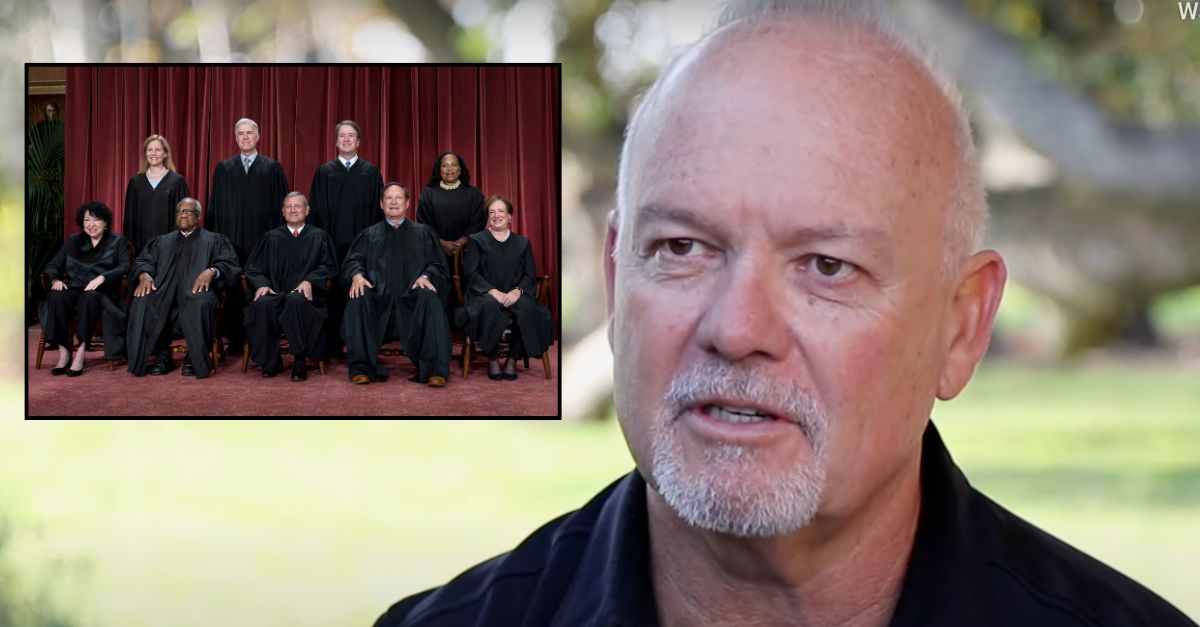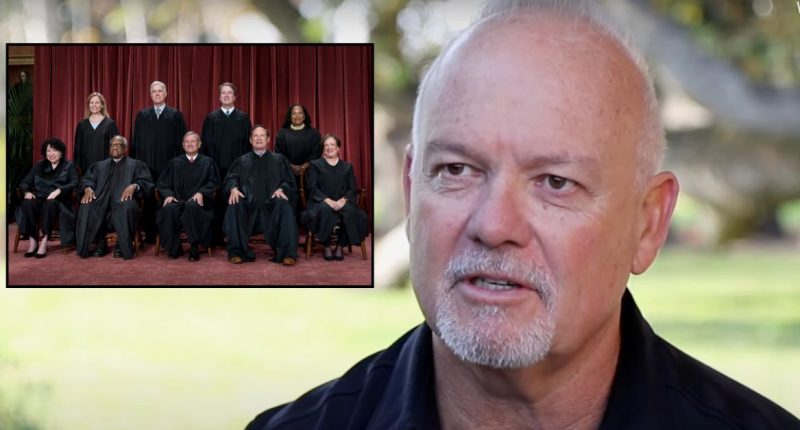
Background: Ronald Hittle (First Liberty Institute). Inset: Members of the Supreme Court sit for a new group portrait in Washington, Friday, Oct. 7, 2022. Bottom row, from left, Associate Justice Sonia Sotomayor, Associate Justice Clarence Thomas, Chief Justice of the United States John Roberts, Associate Justice Samuel Alito, and Associate Justice Elena Kagan. Top row, from left, Associate Justice Amy Coney Barrett, Associate Justice Neil Gorsuch, Associate Justice Brett Kavanaugh, and Associate Justice Ketanji Brown Jackson (AP Photo/J. Scott Applewhite).
For the second time in a single day, Justice Clarence Thomas dissented from the Supreme Court’s decision not to take on a case.
The justices declined to hear the appeal of Ronald Hittle, a fire chief from Stockton, California, who brought a religious discrimination case following his termination after attending a church-sponsored summit for Christian leaders during work hours. The city of Stockton’s position is that Hittle was not fired for any discriminatory reason, but for years of mismanagement, misconduct, and refusals to follow orders of his superiors.
The city received a letter in 2010 describing Hittle as a “corrupt, racist, lying, religious fanatic who should not be allowed to continue as the Fire Chief of Stockton.” That was originally sent anonymously, but was later found to be authored by a high-ranking fire department manager. That same manager told superiors that Hittle was favoring members of an alleged “Christian Coalition” of employees, and that Hittle was engaging in religious activities while on duty.
Following the letter, Hittle’s supervisor directed Hittle “to find and attend a leadership training program” that was intended for fire chiefs or upper management at public entities. The supervisor suggested that Hittle look into offerings by the League of California Cities, the Federal Bureau of Investigation, or the U.S. Post Office. Hittle said he tried to find leadership training programs, but could find none in California that were affordable. Instead, Hittle opted to attend the “Global Leadership Summit” sponsored by a church. The event’s marketing materials said that it was meant to “transform Christian leaders around the world with an injection of vision, skill Development and inspiration for the sake of the LOCAL CHURCH.”
Hittle attended the summit during work time and traveled there using an official city vehicle. Ultimately, the concerns raised about Hittle’s conduct culminated in the city’s hiring an independent investigator to look into allegations of misconduct. According to the investigator’s 250-page report referencing over 50 exhibits, almost all the allegations of misconduct against Hittle were substantiated.
Specifically, the investigator found that Hittle:
(1) lacked effectiveness and judgment in his ongoing leadership of the Fire Department; (2) used City time and a City vehicle to attend a religious event, and approved on-duty attendance of other Fire Department managers to do the same; (3) failed to properly report his time off; (4) engaged in potential favoritism of certain Fire Department employees based on a financial conflict of interest not disclosed to the City; (5) endorsed a private consultant’s business in violation of City policy; and (6) had potentially conflicting loyalties in his management role and responsibilities, including Hittle’s relationship with the head of the local firefighters’ union.
Hittle was fired shortly thereafter and the city provided him with a written list of reasons that included a wide range of specific events that triggered the city’s decision. Hittle sued under Title VII of the Civil Rights Act, and alleged that he was the victim of religious discrimination.
Hittle’s lawsuit
Hittle’s case was dismissed at the district court level for not presenting enough evidence of discrimination, and the dismissal was upheld by the U.S. Court of Appeals for the Ninth Circuit. Both courts applied the legal precedent, which has stood for more than 50 years, that applies to workplace discrimination allegations.
Hittle asked the Supreme Court to weigh in, giving the justices a chance to overturn the test established in a 1973 ruling in the case of McDonnell Douglas Corp v. Green, involving a Black employee who was fired after participating in illegal civil rights demonstrations. That case has been interpreted as setting up a test in which a plaintiff in an employment discrimination case bears the burden of proving that their employer’s stated nondiscriminatory reason for adverse employment action is merely a pretext for discrimination.
Thomas’s dissent
Thomas, in a dissent joined by Justice Neil Gorsuch, criticized the Court for creating the McDonnell Douglas test “out of whole cloth,” and said he would have granted Hittle’s petition for certiorari to determine whether the precedent continues to be a workable tool.
“I am not aware of many precedents that have caused more confusion than this one,” Thomas wrote, adding that he is “skeptical” that the case is helpful at all.
Thomas argued that Hittle should have been given the chance to prove that his employer really did discriminate against him based on his Christian faith, and that the nonreligious reasons for the termination were a mere pretext.
“We are disappointed with the court’s decision regarding this religious discrimination case,” said Kelly Shackelford, President, CEO, and Chief Counsel to First Liberty, the organization that is representing Hittle, in a statement Monday. “We will continue to fight for all people of faith whose religious liberty is threatened.”
You can read the full dissent here.
Love true crime? Sign up for our newsletter, The Law&Crime Docket, to get the latest real-life crime stories delivered right to your inbox.




